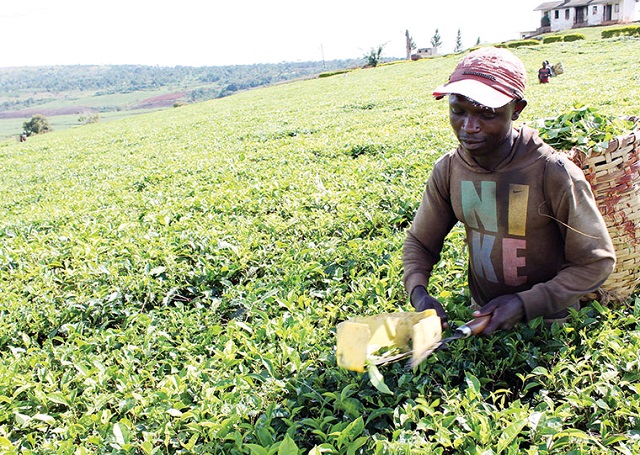
Kampala, Uganda | THE INDEPENDENT | Several farmers in Acholi sub region have signed up to start growing tea on an estimated 32,000 acres of land when the first rainy season sets in 2021.
Tea growing was introduced in Acholi by Edwin Beekunda Atukunda, the founder and executive director of Edwin Foundation Tea Initiative, EFOTI, in 2018. During the year, two acres of tea were planted in Lugore to act as a demonstration farm. Now the crop is being harvested.
Atukunda says that in the last three years, he has raised and distributed about 300,000 seedlings to individual farmers who picked just a handful to prove whether tea can really grow in the Acholi region. After the process, he says a 140-member farmers’ group that was growing coffee, has registered to open 2,000 acres.
In addition, three other farmers in Nwoya have registered to plant a total of 500 acres. Another farmer, David Livingstone Omal from Amuru district says that he has already started his process by preparing a nursery bed where he has planted 100 seedlings. His target is to plant 2000 acres of tea.
Omal says he has mobilized two of his colleagues to plant 700 acres.
Atukunda explains that there are already 10 million seedlings available for distribution to farmers, but more is needed. “The 10 million seedlings are available but an acre consumes about 5,000 seedlings, so just 2,000 acres can consume 10 million seedlings. In Gulu, the CAO has agreed to write for us a letter recommending us to get support from NAADS.”
He says that although the seedlings will be distributed for free, farmers need to register with EFOTI for training on how to plant, caring for the plants and how to control erosion among others. Atukunda noted that members of the Acholi community who are working in tea plantations in Western Uganda are happy with the initiative, knowing that they can return home and continue with the same line of work.
He says tea is labour intensive, and if taken up will employ thousands of people in the sub-region because harvesting requires hand-picking, and not the use of machines.
“Tea growing is an excellent idea because you will not eat or sell it anytime within the community when pressed for money. Besides, when you plant it, you can harvest for as many as 100 years,” he said.
Atukunda urges all districts to endeavour and plant at least 2000 acres and manage it well so that they qualify to get a tea processing factory. There are 36 tea-processing factories, all in Western and South Western Uganda. He says, “It is now that we should plant as much as possible so that we can have a tea factory in Acholi and contribute to the fight against poverty.”
Tea was introduced in Uganda in 1900 and is one of the leading cash crops in the country with an annual export of 65,000 metric tonnes. According to a 2020 report by Ugtea, Uganda is the second leading producer and exporter of tea in Africa, and among 15 in the world.
Last year, EFOTI signed a Memorandum of Understanding with Gulu University to start growing tea. James Onono, the Gulu University assistant public relations officer said that the University will start by setting up a nursery bed to demonstrate to the community who might be interested in tea growing.
*****
URN
 The Independent Uganda: You get the Truth we Pay the Price
The Independent Uganda: You get the Truth we Pay the Price



